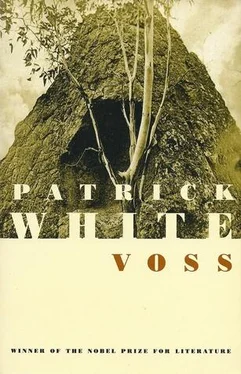He continued to think about the young woman, there on the banks of the river, where the points of her wooden elbows glimmered in the dusk. Then, as it was time and he was tired, he climbed the slope and returned into the house.
Later that night, Voss searched in his valise for paper and his box of pens, and, after seating himself within range of a pair of candles, at a convenient little table covered with a cloth that Mrs Sanderson herself had worked, began to write to those of his patrons who wished to be kept informed, whenever possible, of his movements: rather pompous letters, which they expected, and of which he was capable.
Then, when he had done, he took pen again, almost immediately, and was writing with what would have appeared to an observer in a public room as an intensity of purpose, combined, if it were not so contradictory, with a strange lack of personal control.
Voss wrote recklessly upon the neat sheet of paper:
Rhine Towers,
Oct., 1845
Dear Miss Trevelyan,
It will be surprising for you at this stage to receive such a letter from me, but my recollections of you, together with the peaceful beauty of this country where we have even passed several days of idyllic unemployment in the hands of the most considerate of hosts, have compelled me to put pen to paper, and unite by conscious thought and sentiment all that would appear to have been present by fragments in my mind. For, it would seem that, beneath the cares of responsible preparation for this great expedition, and the many agreeable incidents of the journey thus far, I have ever been aware of your friendliness, and sincere interest in our welfare, as well as the great value I myself place upon our connexion, however slight this may present itself at first, and subordinate in the plan of life that fate has prepared for each of us.
I would hesitate to express my feelings in such personal terms, if I were not aware already of your moral strength and discernment, and that you have happily grasped certain grounds of my character. The gifts of destiny cannot be returned. That which I am intended to fulfil must be fulfilled. Consequently, I am aware that a companion must stumble almost daily over the savage rocks of circumstance, but that a companion of strength and judgement, such as I have already perceived to exist, would be forearmed against destruction.
Materially, I have nothing to offer. I am convinced, however, that my mission will be accomplished; this I would pledge against any quantity of gold or bonds. Dear Miss Trevelyan, do not pray for me , but I would ask you to join me in thought, and exercise of will, daily, hourly, until I may return to you, the victor.
In the meantime, also, I would ask your allowance that I may write to your Uncle, Mr Bonner, with necessary formality, for your hand.
So, I have little more to say at this late hour, and tomorrow start by lanternlight. At Jildra, the property of Mr Boyle on the Darling Downs, I can receive your answer, if you are so agreeable. Weigh carefully every possible consideration, but do not overweigh, for Jildra is my last chance!
From Jildra also I hope to write you interesting details of flora and fauna encountered, and to include some account of our behaviour on the march. I will give this now to Mr Sanderson, whose men descend periodically by wagon to Newcastle, and hope that from there it will be dispatched with all possible speed and safety into your kind hands.
Yours most respectfully,
JOHANN ULRICH VOSS
Next morning, while the lamps of friendship hovered touchingly in the dew and darkness, and naked voices offered parting advice, the company began to move northward, with the intention of crossing New England. It was a good season, and the land continued remarkably green, or greyish-green, or blue-grey, the blue of smoke or distance. These were sparkling, jingling days, in which sleek horses, blundering cattle, even the sour-heeled mules had no immediate cause for regret. Men shouted to their mates, their voices whipping the blue air, or else were silent, smiling to themselves, dozing in their well-greased saddles under the yellow sun, as they rubbed forward in a body, over open country, or in Indian file, through the bush. At this stage they were still in love with one another. It could not have been otherwise in that radiance of light. The very stirrup-irons were singing of personal hopes.
As the party advanced, settlers came down to show it kindnesses, or to hang about, if too shy, with every sign of respectful curiosity. The especial object of all these individuals was to catch a glimpse of the foreigner, with whom, of course, even the boldest did not presume to communicate on account of the peculiarities of his speech. However careful he was to imitate their own, the settlers preferred to address a member of his party; the honour of his presence was enough. The foreigner himself remained indifferent. Seated on his horse and intent on inner matters, he would stare imperiously over the heads of men, possessing the whole country with his eyes. In those eyes the hills and valleys lay still, but expectant, or responded in ripples of leaf and grass, dutifully, to their bridegroom the sun, till all vision overflowed with the liquid gold of complete union.
The demands Voss made on his freshly-formed relationship were frequent and consuming, but, although exhausted by an excess of sensuousness, it was a period of great happiness to him and, in consequence, of unexplained happiness to everyone else.
THE source of irritation had been removed from Mr Bonner with departure of the expedition. Now he could enjoy its purpose, now that it was becoming history, hence impersonal. To such as Mr Bonner, the life we live is not a part of history; life is too personal, and history is not. So the merchant returned to those personal pleasures, of house and family, business and equipage, and quite considerable bank account. If customers or friends ever alluded to that other matter of exploration for which Mr Bonner had, in fact, been personally responsible, he would smile what was an ethereal smile, for one so hearty, and materialist, and self-willed, and proceed to hold forth, between the chinking of the money in his pocket, on the historical consequences of such an expedition. But thanks be, it no longer directly concerned him. The Crusades were not more remote. No doubt he would have subscribed to a Crusade, just as he would continue, if called upon, to support the expedition, but in hard cash, and not in sufferings of spirit. While approving of any attempt to save the souls of other men, he did appreciate the comfort of his own.
The comforts, both material and spiritual, so conveniently confused in comfortable minds, inspired the merchant’s residence. Of solid stone, this had stood unshaken hitherto. As a house it was not so much magnificent as eminently suitable, and sometimes, by pure chance, even appeared imaginative, in spite of the plethora of formal, shiny shrubs, the laurels, for instance, and the camellias that Uncle had planted in the beginning. The science of horticulture had failed to exorcise the spirit of the place. The wands and fronds of native things intruded still, paperbarks and various gums, of mysterious hot scents, and attentive silences: shadowy trees that, paradoxically, enticed the eyes away from an excess of substance. Moreover, the accents of poetry were constantly creeping in through the throats of doves, and sometimes young ladies might be seen, sampling strawberries from the netted beds, or engaged in needlework in a little latticed summer-house, or playing croquet with the military, but later, in the afternoon, when the hoops made long shadows on the crisp grass.
The Bonners’ garden was a natural setting for young ladies, observers were aware, particularly for the niece, who was of a more solitary nature, and given to dabbling in flowers — in a ladylike manner, of course — when the climate permitted. In the mornings and the evenings she would be seen to cut the spring roses, and lay them in the long, open-ended basket, which the maid would be carrying for that purpose. The maid was almost always at her heels. People said that Miss Trevelyan demanded many little, often unreasonable, services, which was only to be expected of such an imperious young person, and a snob.
Читать дальше












